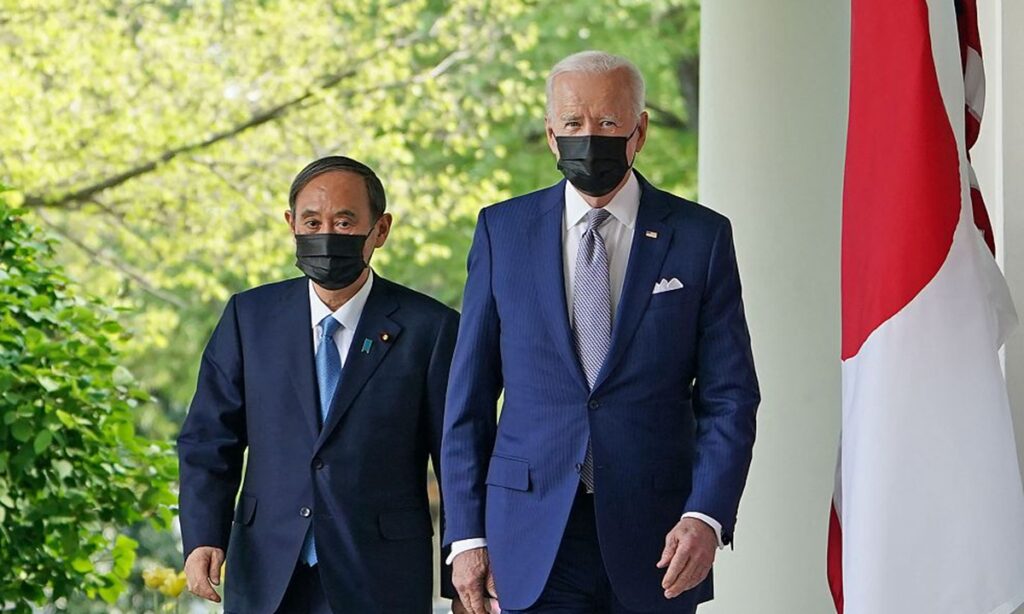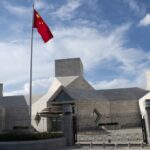Acting as a vassal of the US, Japan escalated its interference in China’s affairs as leaders of Japan and the US made China a focus of their meeting and for the first time in half a century mentioned China’s Taiwan in their joint statement.
Experts said Japan should refrain from completely siding with the US to harm China’s interests, or the regional stability and the huge benefits it enjoys from expanding economic and trade with China will surely suffer.
US President Joe Biden and Japanese Prime Minister Yoshihide Suga released a joint statement after the meeting in Washington, which highlighted the US-Japan alliance for “peace and security” in the Indo-Pacific region and portrayed China as a negative influence in the region.
It was the first time Japanese and American leaders mentioned Taiwan in a joint statement since the meeting of Eisaku Sato and Richard Nixon in 1969 before China and Japan had built diplomatic relations. The joint statement made direct remarks on China’s internal affairs including Taiwan, Hong Kong and Xinjiang.
China lodged solemn representations with Japan and the US over their interference in China’s internal affairs and their groundless accusations on China, Chinese embassy in Japan announced after the US-Japan statement pointed the finger at China. Chinese embassy in the US released a statement and strongly condemned the US and Japan’s remarks interfering in China’s internal affairs and their attempt to provoke regional instability.
Observers noted that the direct mention of Taiwan is a severe interference of China’s domestic affairs and sends a signal that Japan and the US are attempting to contain China’s possible moves to reunify with the island of Taiwan.
Any attempt to undermine China’s bottom line on the Taiwan question will definitely backfire, experts warned Japan, reminding that there are “unbearable” consequences that Japan will have to shoulder.
The joint statement demonstrates the hypocrisy of the US and Japan as the mention of Taiwan will send a wrong signal and adding fuel to the Taiwan separatists. This is to further bring regional instability where Japan will suffer.
Vague expressions that actually alluded to the Taiwan Strait, such as the “surrounding area” and the “surrounding situation” had been featured in the US-Japan statements before, but not directly mentioning Taiwan.
The direct remarks have gone beyond the normal scope of bilateral relations, and undermines peace and stability in Asia-Pacific, Chinese Embassy in the US said after the release of the joint statement. It is ironic that an attempt by a “small circle” of the US and Japan to divide and target other countries in Asia-Pacific would be described as “free and open.” Such an attempt is bound to end up backfiring, especially when it started out with the purpose of harming others.
China-Japan relations had gradually improved since 2018. The escalated interference concerning Taiwan island, which is at China’s core interest, puts in jeopardy the China-Japan relations, Da Zhigang, Director and Research Fellow of the Institute of Northeast Asian Studies at the Heilongjiang Provincial Academy of Social Sciences, told the Global Times.
Japan is falling into the US’s trap by risking peaceful relations with China, said Lü Xiang, a research fellow on US studies at the Chinese Academy of Social Sciences in Beijing.
Lü warned that as a close neighbor of China, Japan has to rethink any consequences that may result from its actions, urging Japan to make clarification to China soon.
Experts have said Japan should avoid military conflicts with China as much as possible. Japanese political elites must try their best to ensure that Japan avoids becoming a sacrifice of the US.
China is far more important to Japan than Washington is to Tokyo in terms of trade and economy. China became Japan’s top export destination in 2020, leapfrogging the US and consuming more than 22 percent of Japanese goods sold overseas, according to data from Japan’s Ministry of Finance.
Predictions show that Japanese economy is unlikely to resume to the level of 2019 in the second quarter of 2022. Japan needs economic stimulus, and harming ties with China will only have counterproductive impact on Japan, according to Lü.
Li Haidong, professor at the Institute of International Relations at the China Foreign Affairs University, told the Global Times on Saturday that the US and Japan’s rhetoric of the maintenance of “peace and stability of the island of Taiwan” is in itself hypocritical.
The stability of the island was disturbed by the continuous presence of US warships in the Taiwan Straits and Japan’s strong ties with the Democratic Progressive Party, Li said.
Experts warned that Japan and the US are playing with fire on the Taiwan questions. Their moves will only send the wrong signal to the Taiwan separatists and allow the DPP to go further down the wrong path; thus it will further provoke regional instability, experts noted.
The mutual cooperation of the US and Japan based on the so-called democracy and an imaginary “common threat” can be seen as a signal of their open intervention into affairs of other countries, especially those that differ ideologically from the West, Li said.
Li pointed out that the US-Japan joint statement once again shows the fact that Japan is just a vassal of the US in terms of security and politics. It is apparent to all that the main intention of the joint statement is to create crisis, division and confrontation in the Asia-Pacific region in order to benefit the Indo-Pacific strategy of the US.
Before Suga’s visit, Japan had already triggered regional outcry after its decision to dump radioactive water from the Fukushima nuclear plant into the ocean. However, the joint statement did not mention this issue at all.
It is “ridiculous” that the two leaders ignored the question of Japan’s decision to dump contaminated radioactive wastewater in Fukushima Prefecture into the sea, an issue many countries in the world are concerned about, Li said.
“It is such a hypocrisy and double standards for them to simply put aside the well-being and health of the world and fully devote themselves to pursuing a narrow-minded issue about the so-called strategic competition with China,” he said.
Countries in the region, including China, Russia, North Korea, South Korea and the Philippines have expressed their deep concerns over Japan’s decision of dumping the wastewater.
Photo: VCG



